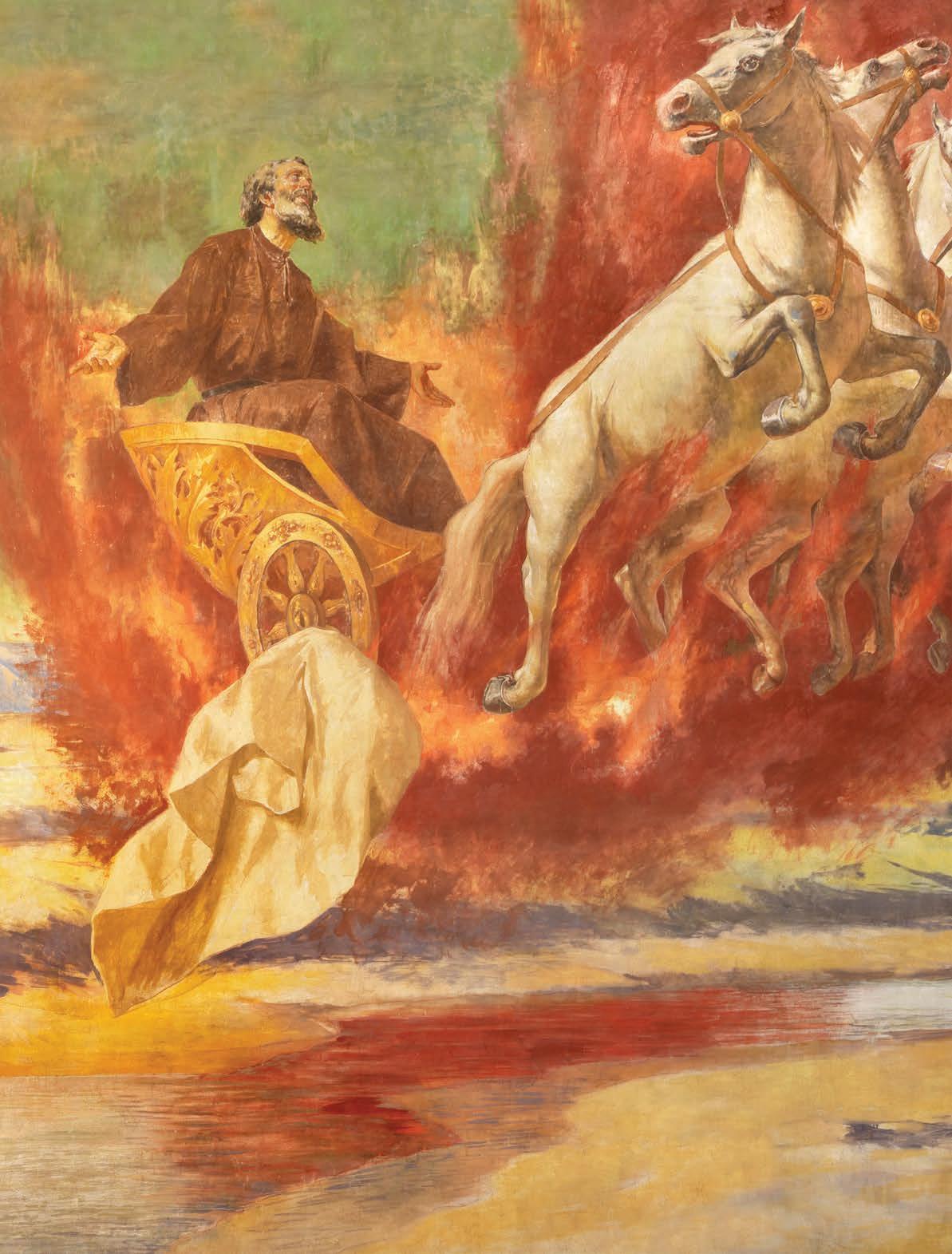
19 minute read
The Fiery Sword of the Prophet Elias
BY RENATO VASCONCELOS
Nine centuries before the coming of the Redeemer, the fiery prophet Elias was consumed with zeal for the Lord God of hosts. Transported by angels in a fiery chariot, he was likely taken to the earthly paradise. From this privileged position, he monitors the developments within the history of salvation, their core being the struggle between good and evil, the children of light and the children of darkness, and those who follow God and those who give themselves over to the devil. The Prophet Elias, deemed as the founder of the Carmelite Order, plays a unique role in this battle that will last until the end of time. He was an indomitable and relentless fighter against idolaters and will return at the end of time to fight against the Antichrist.
The History of Salvation and the Chosen People
The history of salvation and the struggle between good and evil begins with our first parents, Adam and Eve. Original sin led to their expulsion from paradise and the loss of their preternatural gifts. Suffering, pain and death became our shared heritage. The terrible consequences of original sin on human nature were tragically manifested in the first couple’s children when Cain killed Abel. The earth indeed became a “vale of tears.”
Following the divine order, “grow and multiply,” generations succeeded generations. Still, entire peoples fell into idolatry, a sin that God punishes with tremendous chastisements. Humanity was almost extinguished in the universal flood, which only spared Noah and his family. The Tower of Babel confused languages and dispersed peoples. However, in the night of time, chosen souls upon whom divine benevolence rested shone here and there. Along with the punishment also came the promise fulfilled four thousand years later: a Redeemer would open the gates of heaven to fallen humanity.
In His designs, God had mercy on men and established a chosen people. He promised Abraham a land and descendants more numerous than the stars of the sky and the sands of the sea (Gen. 12). He tested the patriarch’s fidelity by ordering him to sacrifice his son Isaac, conceived in his old age, an order that Abraham did not hesitate to obey. Faithful to His promise, God rewarded him by replacing Isaac with a lamb at the time of the sacrifice. From Isaac was born Jacob, whose children gave birth to the twelve tribes. Initially nomadic, the tribes settled in Egypt after Jacob’s death, when his son Joseph had become Pharaoh’s prime minister. But then came a pharaoh who had not known Joseph, and Jacob’s descendants went into a four-century-long captivity.
Freed by Moses at God’s command, the chosen people miraculously walked briskly through the Red Sea. On Mount Horeb, Moses received the tablets of the law with the Ten Commandments, the symbol of their covenant with God. But at that very moment, tired of waiting, part of the people at the foot of the mountain fell into idolatry, worshipped a golden calf and were severely punished by the Levites. It took another forty years of wandering in the desert before the chosen people finally entered the promised land with Joshua. Once there, they were led by judges and prophets.
A thousand years after the promise made to Abraham, God sent the Prophet Samuel to anoint Saul. A great warrior and organizer, Saul became the first king of Israel. But he consulted a witch, and God punished his deception with death during a battle. David, his successor, conquered Jerusalem and made it the capital of the twelve tribes. Solomon made the country prosperous and built the first temple in Jerusalem, a beautiful shrine for the Ark of the Covenant, where they offered sacrifices to the one true God.
However, the wise King Solomon had dozens of wives, many from idolatrous peoples, and had temples erected to worship Baal, Moloch, Astarte, Kamosh and AmonRa. His son Jeroboam propagated idolatry, compromising all the efforts Moses had made to pull the chosen people out of their idolatrous tendencies. Divine punishment would not take long in coming. The kingdom was divided: Israel with ten tribes to the north, and Judah with two tribes to the south. The northern kingdom was dragged almost entirely into apostasy, worshipping Baal, the god of fornication, and served by 850 priests, under the command of King Achab and his wife, Jezebel.
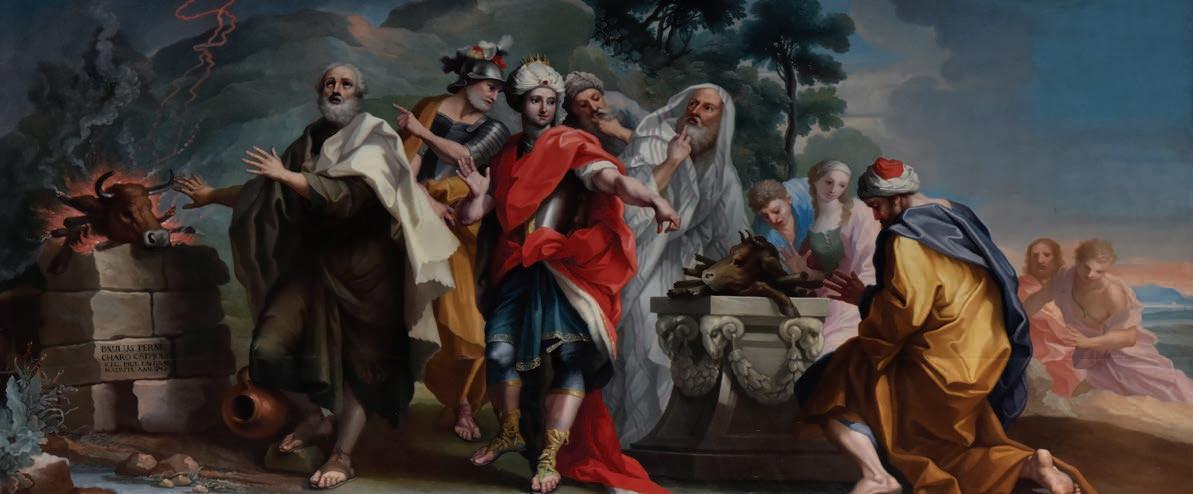
Painting of Elias and the prophets of Baal by Pablo Pernicharo, Church of San José, Madrid, Spain
Apostasy of the Chosen People and the Prophetic Rebuke
In this context of apostasy, where the pestilence of idolatry affected great and small, the Prophet Elias arose to vindicate the rights of the true God: “And Elias the prophet stood up as a fire, and his word burnt like a torch” (Ecclus. 48:1). Seeing the tremendous religious and moral degradation of his people, and inflamed with zeal for God’s glory, Elias rebuked King Achab: “As the Lord liveth the God of Israel, in whose sight I stand, there shall not be dew nor rain these years, but according to the words of my mouth” (3 Kings 17:1).
Cornelius a Lapide (1567–1637), a famous Jesuit biblical scholar, comments on this subject: “There is no doubt that Elias, overflowing with zeal, had previously urged King Achab to abandon the cult of Baal and worship the true God. Since the king turned a deaf ear, Elias turned his words into a whip and smote the whole land with barrenness so that Achab and the idolaters would learn that it is not Baal but the true God who gives rain and all the other goods of the earth. Invoke Him and not Baal, that you may obtain all these things.”
Saint John Chrysostom refers to this passage in these terms: “When the most holy Prophet Elias set his eyes on the wayward people, when he saw Baal and the idols being sacrilegiously worshipped with contempt of the Lord, when all the people, abandoning their Creator, were giving themselves over to the worship of clay statues in the woods, [Elias], moved by his zeal for God, issued against Judea a sentence of drought and an end to the rains. Then, suddenly, the earth threw up vapors, the sky closed, the rivers dried up, the springs were extinguished, the bronze boiled, the temperature tortured [people], tranquility turned to pain, nights became dry, days arid, cornfields roasted, bushes faded, meadows disappeared, woods lost their sap, fields fasted, the land became uncultivated, its grasses died and the wrath of God was manifested over all creatures.”
Achab’s hatred flared up, and God ordered Elias to retire to the desert, where ravens would bring him food. The sky closed in and became as heavy as lead, the earth was barren and water from the rivers and torrents evaporated. The prophet felt on his own skin the terrible punishment inflicted on Israel.
The First Resurrection in History
Elias went to Zarephath, a town between Tyre and Sidon, where he was sheltered by a poor widow who had no more than a handful of flour to make a loaf of bread. Generously, she gave the prophet what flour she had left to sustain his life. She was rewarded by God, for from that day on there was no lack of flour in the pot, nor any less oil in the oilcan. But poverty was accompanied by tragedy, for the widow’s only son died, and she complained to the man of God who had brought her such misfortune. “And Elias said to her: Give me thy son. And he took him out of her bosom, and carried him into the upper chamber where he abode, and laid him upon his own bed. And he cried to the Lord, and said: O Lord my God, hast thou afflicted also the widow, with whom I am after a sort maintained, so as to kill her son? And he stretched, and measured himself upon the child three times, and cried to the Lord, and said: O Lord my God, let the soul of this child, I beseech thee, return into his body. And the Lord heard the voice of Elias: and the soul of the child returned into him, and he revived” (3 Kings 17:19–22).
The son of the widow of Zarephath came back to life, becoming the first case of resurrection known in history.
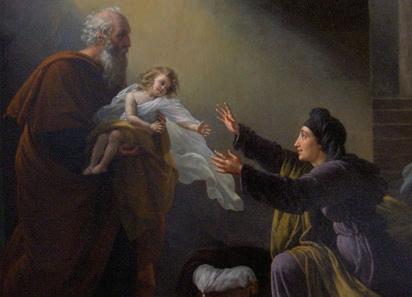
Saint Elias restores life to the widow’s child. Louis Hersent, 1819, Musée de Anger
Wikimedia Commons
Elias Confronts the Prophets of Baal
Meanwhile, the drought was becoming unbearable. Three unforgiving years went by without a single drop of water falling on those arid and harsh lands. When God sent Elias to find Achab to make the drought stop, the king questioned the prophet:
“Art thou he that troublest Israel? And he said: I have not troubled Israel, but thou and thy father’s house, who have forsaken the commandments of the Lord, and have followed Baalim. Nevertheless send now, and gather unto me all Israel, unto mount Carmel, and the prophets of Baal four hundred and fifty, and the prophets of the groves four hundred, who eat at Jezebel’s table. Achab sent to all the children of Israel, and gathered together the prophets unto mount Carmel” (3 Kings 18:17–20).
Before the prophets of Baal, Elias challenged the people: “How long do you halt between two sides? If the Lord be God, follow him: but if Baal, then follow him. And the people did not answer him a word. And Elias said again to the people: I only remain a prophet of the Lord: but the prophets of Baal are four hundred and fifty men. Let two bullocks be given us, and let them choose one bullock for themselves, and cut it in pieces and lay it upon wood, but put no fire under: and I will dress the other bullock, and lay it on wood, and put no fire under it. Call ye on the names of your gods, and I will call on the name of my Lord: and the God that shall answer by fire, let him be God” (3 Kings 18:21–24).
Baal’s priests sacrificed an ox, put it on wood, cut its cheeks and torso with knives and stilettos, whirled around, and cried out loudly to Baal, who did not answer them. Elias taunted them, “Cry with a louder voice: for he is a god, and perhaps he is talking, or is in an inn, or on a journey, or perhaps he is asleep, and must be awaked” (3 Kings 18:27).
The false prophets jumped up and danced desperately, offering their blood to the idol. The idolatrous blood flowed, but in vain, as no fire fell from heaven. Elias then built an altar with twelve stones corresponding to the number of the tribes of Israel, laid out the wood on which he poured water in abundance and placed the sacrificial ox on the altar. He then addressed God:
“O Lord God of Abraham, and Isaac, and Israel, show this day that thou art the God of Israel, and I thy servant, and that according to thy commandment I have done all these things. Hear me, O Lord, hear me: that this people may learn, that thou art the Lord God, and that thou hast turned their heart again. Then the fire of the Lord fell, and consumed the holocaust, and the wood, and the stones, and the dust, and licked up the water that was in the trench. And when all the people saw this, they fell on their faces, and they said: The Lord he is God, the Lord he is God. And Elias said to them: Take the prophets of Baal, and let not one of them escape” (3 Kings 18:36–40).
The false prophets of Baal were killed near the river Cison, partly by Elias, partly by the people. Elias’ zeal led him to slay more idolaters than he converted, for, in addition to the 850 diviners and false prophets, he wiped out many more with the three-year drought. He was much more concerned with justice and punishment of the wicked than with mercy and charity in converting them.
Filled with admiration, Father Cornelius a Lapide emphasizes the prophet’s fiery spirit: “Elias was a living mirror of the preachers of the word of God. Indeed, fiery was his mind, fiery his word, fiery his arm, with which he converted Israel.”1
The Prophet Escapes and Receives a New Mission
Elias went to King Achab and prophesied the end of the terrible drought: “Go up, eat, and drink: for there is a sound of abundance of rain.” Accompanied by a servant, Elias climbed to the top of Mount Carmel, prostrated himself with his head between his knees, and prayed for rain until his servant told him that a small cloud appeared over the sea and on the edge of the horizon.2 It did not take long for a great rainstorm to fall, ending the three-year drought imposed as a punishment for the sin of idolatry.
Meanwhile, Jezebel learned of the death of her false prophets and vowed to kill Elias. She sent a messenger to him, saying, “Such and such things may the gods do to me, and add still more, if by this hour tomorrow I make not thy life as the life of one of them” (3 Kings 19:2).
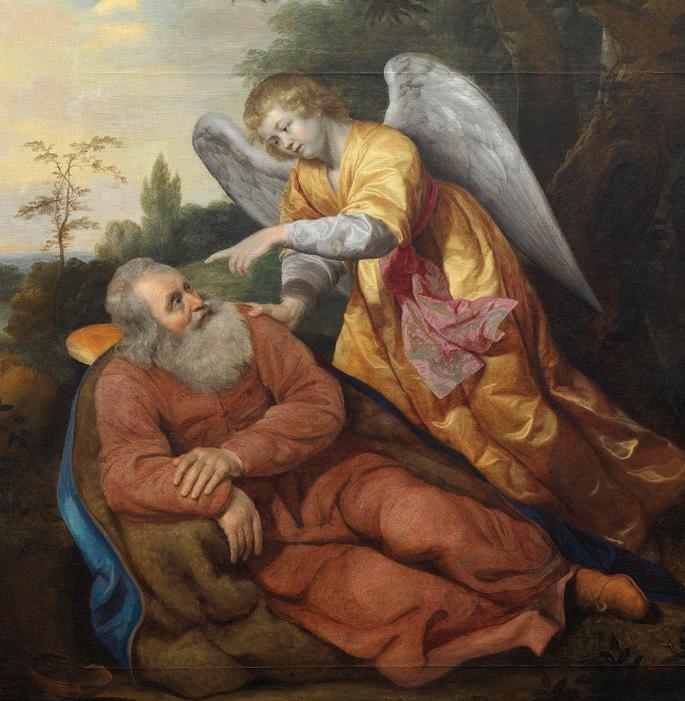
The angel visits Elias in the desert. Artist unknown, seventeenth century.
Wikimedia Commons
Jezebel’s threat frightened the prophet Elias (whose name means, in Hebrew, “my God is the Lord”), who having closed the sky with a word from his mouth, faced the powerful king Achab, raised a dead man and killed the prophets of Baal, trembled before Jezebel’s wrath. According to Cornelius a Lapide, he feared imminent death not so much as the danger that the true faith be extinguished in Israel and the false Baal worship be victorious.
Elias fled into the desert, where an angel brought him bread and water, and God commanded him to go to Mount Horeb. He walked forty days and forty nights to Mount Horeb, where he heard the voice of God: “What doest thou here, Elias?”
He answered, “With zeal have I been zealous for the Lord God of hosts: for the children of Israel have forsaken thy covenant: they have thrown down thy altars, they have slain thy prophets with the sword, and I alone am left, and they seek my life to take it away” (3 Kings 19:9–10).
Now God did not speak to Elias in an earthquake but in “a soft and gentle whisper.” He gave him a threefold mission: to anoint Hazael as king of Syria, Jehu as king of Israel and Elisha a prophet “in his place.” Elias found Elisha plowing a field and cast his mantle over him. Henceforth Elisha would be entirely transformed from being a wealthy farmer (he owned much land and twenty-four yokes of oxen), to a prophet and a prophet’s successor.
Jezebel’s Punishment
Now King Achab coveted a vineyard that belonged to Naboth of Jezrael. Although Achab offered him a fair price or even a better vineyard elsewhere, Naboth would not sell it because it was an inheritance from his parents. Seeing her husband’s sadness and anger, Jezebel promised him that the vineyard would be his. She ordered the city elders to organize a meeting where Naboth would be (falsely) accused of having blasphemed. So it was done. Naboth was stoned to death, and Achab took possession of his land. It was a twice heinous crime: cowardly murder and embezzlement. Thus, divine punishment did not wait.
God commanded Elias to go meet Achab, upbraid him and announce his coming punishment: “Thus saith the Lord: Thou hast slain, moreover also thou hast taken possession. And after these words thou shalt add: Thus saith the Lord: In this place, wherein the dogs have licked the blood of Naboth, they shall lick thy blood also” (3 Kings 21:19). He also announced the punishment of Jezebel: “The dogs will eat Jezebel in the field of Jezrael.”
Achab did penance more for fear of punishment than out of love for justice. It was a servile, imperfect penance. He repented of his sin because of the imminent and terrible punishment decreed by Elias. He did not repent for love of God, for having offended Him Who is the highest good. God delayed his punishment, and Achab died on the battlefield, wounded by an enemy dart.
Meanwhile, divine wrath fell unrelentingly on the head of the wicked Jezebel. Thrown from her palace window, she lay on the ground trampled by horses’ hooves and was devoured by hungry dogs. When some servants rushed to recover and bury her corpse, they found only her skull and a few bones.
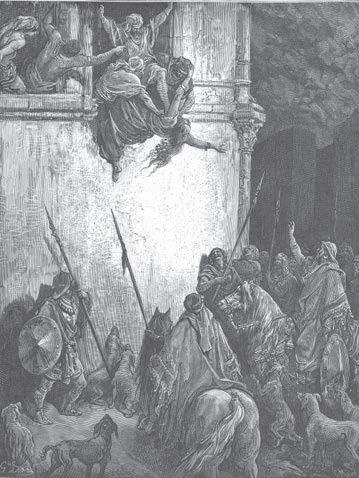
The wicked queen Jezebel meets her fitting death; thrown from the palace window, trampled and devoured by hungry dogs. Pen and ink drawing by Gustave Doré.
Ochoziah succeeded his father Achab. One day, he fell from the high room of his palace in Samaria. Bedridden, he wanted to know if he would survive, and sent his messengers to consult an oracle of Beelzebub. Elias intercepted the messengers and rebuked them for their idolatrous superstition.
Angered at the news, Ochoziah sent a captain with fifty men to arrest Elias. The captain addressed him in a derogatory way: “Man of God, the king has commanded that thou come.” Elias answered to the captain of fifty men, “If I am a man of God, let fire come down from heaven and consume thee and thy fifty.” And there came down fire from heaven, and consumed him, and the fifty that were with him. Ochoziah sent another captain with fifty men, and they too were consumed by fire from heaven. For the third time, Ochoziah sent a captain with fifty soldiers, and this time the commander begged for mercy. Elias spared his life and those of his subordinates.
Accompanied by this captain, Elias went to speak to the king: “Thus saith the Lord: Because thou hast sent messengers to consult Beelzebub the god of Accaron, as though there were not a God in Israel, of whom thou mightest inquire the word; therefore from the bed on which thou art gone up, thou shalt not come down, but thou shalt surely die” (4 Kings 1:16). Ochoziah died after reigning for only one year.
In the words of Saint Bernard to Pope Eugene III, by vindicating the rights of God, Elias was the model of justice, mirror of holiness, example of piety, champion of truth, defender of the faith, doctor of Israel, teacher of the uneducated, refuge of the oppressed, advocate of the poor, an arm of widows, eye of the blind, the tongue of the dumb, avenger of crimes, dread of the wicked, glory of the righteous, rod of the mighty, hammer of tyrants, father of kings, salt of the earth, the light of the world, the prophet of the Most High, forerunner of Christ, the anointed of the Lord, terror of the Baalites and thunderbolt of idolaters.3
The Fight against the Antichrist
Elias fulfilled the threefold mission God had entrusted to him at Horeb. The time was approaching for him to leave the earth. For an ordinary person, this necessarily means passing through the threshold of death. However, divine Providence had other plans for Elias, the prophet of great exceptions. Some scholars believe the angels took him on a chariot of fire4 to an unknown place on earth; others, that he went to the earthly paradise. As he was taken up to heaven, he threw down his cloak to Elisha, his disciple and successor.

From his place in heaven whence he wast taken in a whirlwind of fire, in a chariot of fiery horses, “consumed with zeal for the Lord God of hosts,” the prophet Elias follows the unfolding history of salvation.
© Jozef Sedmak | Dreamstime.com
Thus, from his place, “consumed with zeal for the Lord God of hosts,” the prophet Elias follows the unfolding history of salvation.5 He contemplates the extreme decadence of modern times, when the laws of the Lord God are trampled upon like never before. He despises the idols which twenty-first century men have erected to Moloch, the god associated with child sacrifice, through the unspeakable sin of abortion; or to idols of sensuality with the increasing number of sexual immoralities added and accepted by society at large; finally, he can scarcely hold back his fiery sword when he witnesses the corruption and betrayal of members of the One True Church of Christ.
We pray to Saint Elias for the grace of perseverance and fidelity to the Lord of Hosts in these challenging times and we join our supplications to Ecclesiasticus . . .
“And who can glory like to thee? Who raisedst up a dead man from below, from the lot of death, by the word of the Lord God. Who broughtest down kings to destruction, and brokest easily their power in pieces, and the glorious from their bed. Who heardest judgment in Sina, and in Horeb the judgments of vengeance. Who anointedst kings to penance, and madest prophets successors after thee. Who wast taken up in a whirlwind of fire, in a chariot of fiery horses. Who art registered in the judgments of times to appease the wrath of the Lord, to reconcile the heart of the father to the son, and to restore the tribes of Jacob. Blessed are they that saw thee, and were honoured with thy friendship” (Ecclus. 48:4–11). ■
Endnotes
1. Cornelius a Lapide, Commentaria in Scripturam Sacram, (Ludovicus Vivès, Editor, Paris, 1860), vol. X, p. 504.
2. “A precursor of rain, the little cloud is also a symbol of the coming of the Immaculate Virgin Mary, who emerges pure from the world’s salty waters to be the Mother of the Redeemer,” comment the exegetes. Saint Elias was thus the first devotee of Our Lady more than eight centuries before her birth.
3. De Consideratione, lib. IV, Cornelius a Lapide, Commentaria in Scripturam Sacram, in Librum III Regum, Cap. XVII.
4. It suited the fiery soul of Elias to be kidnapped and taken up to heaven in a chariot of fire, comments Saint John Chrysostom, 1st Homily De Elia.
5. The exegetes Saliano and Genebrardo assert that Elias was abducted in the nineteenth year of the reign of Josaphat, according to Saliano, in the year 3139 of the creation of the world and 914 years before the birth of Christ. On this the Jews practically agree with Seder Olam, Josephus, St. John of Avila, Torniello, Serarius and others. Hence today, in 2021 A.D., Saint Elias is about 2,981 years old, since, according to Cornelius, Elias is thought to have been kidnapped when he was about forty-six years old, after having exercised for sixteen years the prophetic mission that began when he was thirty.










